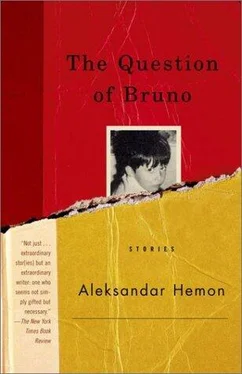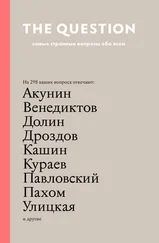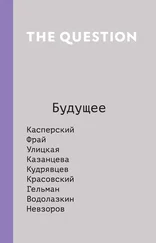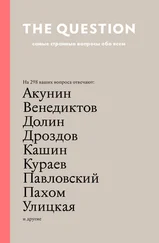The banal symbolism of these dreams notwithstanding, we should note that they suggest the situation of being in a maze.
Andrea came back home after work, made some tea for Pronek, gave him a bowl of Wheaties floating in glistening milk, kissed his cold forehead (in between surges of fever) and then took off to a gallery opening. She didn’t come back that night, and Pronek kept sweating, until the sheets were so soaked, sticking to his febrile body, that he had to get up and rummage through her closets, looking for virgin sheets, only to find a notebook with a little lock, under a pyramid of towels. But Pronek was shivering and had no strength to read it, fearing that he might find out things he didn’t care to know. So he took a couple of towels and spread them, like magic carpets, on the naked mattress, and proceeded to perspire. He didn’t know how long he stayed in bed — intermittent kisses, tepid cups of tea, and waking up in a cold, moist bed all merged into one long repetitive action, like a busy signal. If we were to ask him now, he could probably remember the wind banging at the window, and infernal electronic voices shrieking “Touchdown! Hee hee hee …!” He would have a dim recollection of calling his parents: his father told him it would be unwise to come back to Sarajevo, while his mother told him that there already was less shooting than yesterday, and that they missed him.
Once he mustered up some energy, while the fever was recovering somewhere in his body, and found Carwin and a legion of his buddies gathered around the TV, which had a porn flick on. It took Pronek a while to recognize the gaping vagina — the slurping sound it was making confused him. But they weren’t watching it, they were deeply invested in throwing a hacky sack at the revolving ceiling fan, which would slam the hacky sack against the wall every now and then. In celebration of the fan’s success, someone would say, “Shit!” and get to suck on the pot pipe, shaped as the Grim Reaper.
There was a guy named Chad, and he was a history student.
Chad stayed for the rest of the week, sleeping on the couch, because he had to play a season of Tecmo Bowl with Carwin: Carwin was the Cowboys, while Chad was the Redskins. Pronek spent that week between the bed and the kitchen table, sometimes trying to write letters, but all of his sentences would fall apart before reaching the paper. Andrea had disappeared. Carwin claimed that she went to DeKalb for a couple of weeks, because she needed a break. Occasionally, between virtual football games and porn flicks, Pronek got to watch Headline News and learn that paramilitary (“Pornomilitary” punned Chad) units were entering Bosnia from Serbia. Carwin and Chad watched images of men in fatigues and a woman talking about massacres of Muslims in the eastern parts of Bosnia.
“This is depressing,” Carwin said.
“What’s with you people,” Chad asked. “Can’t you chill out?”
“They just hate each other over there,” Carwin said.
“Are you going back?” Chad asked.
“I’m supposed to fly back in couple of weeks,” Pronek said.
“Why don’t you stay here?” Chad asked.
“What can I do?” Pronek said. “My family is there.”
“Man, I wish I’d never see my fuckin’ family again,” Car-win said and wedged his hand furiously into his pants.
“You should stay and get your family out and let those fuckers kill each other if they want,” Chad said. Chad had an uncanny ability to bend his legs so much that he would effortlessly sit in the lotus position, like an Indian sage, while playing football, his thumbs pressing the buttons with incredible speed.
“I mean, fuck, war is good. If we didn’t have war, there would be way too many people, man. It’s like natural selection, like the free market. The best get on the top, the shit sinks. I don’t know much about you, Russkie, and I don’t like you, but if you got here you must be worth something. It’s like those immigrants, man, they were shit at home, they got here, they became fucking millionaires. That’s why we’re the toughest motherfucking country in the world. Because only the fittest survive here.”
Carwin was sucking on a McDonald’s straw, watching the news about the Bulls. “Man,” he said. “We’re gonna kick ass this year again.” Pronek crawled back into his (well, Andrea’s) room and lay there, while the dusk was setting in, until he could see twig shadows trembling on the wall.
Andrea came back from DeKalb the next morning, refreshed. “Boy,” she said. “I was tripping for days.” When she entered the room, Pronek was heading to the bathroom to look in the mirror, stepping over the red pasta-sauce sea on the floor. He had two weeks’ worth of minuscule growth on his face, which made his face look smudged with coal dust, and he was wearing her bathrobe, his shorts barely hanging on to his hips.
He had lived on Carwin’s supply of Twinkies for two weeks.
That morning he woke up after a night of unsettling dreams, and saw his body as someone else’s body. His toes were miles away; his knees were two round dunes. He looked at his hands and they raised their heads to look back at him with hostility. He didn’t know what he was. But when Andrea walked in and looked at him, he suddenly recognized himself as a foreigner — uncouth, unseemly, unpleasant body, with nowhere to go. He went to the bathroom, and shaved and washed, performing a ritual, as if celebrating his new identity.
Next day, they went to Andrea’s parents’ house for dinner.
They drove down Lake Shore Drive, the waves attacking the shore, while trees bent sideways, as if stretching their backs in an aerobic exercise. Andrea whistled and wheezed “Dear Prudence,” and after they listened to the newsbreak that talked about the imminent war in Bosnia, she said: “You should stay, you know.” “I know,” Pronek said. The street lights had glaring clarity, because of the frigid northern wind. They drove past the dark castles of the University of Chicago (“This is where they built the first nuke bomb,” she said) and entered a maze of identical red-brick buildings.
Andrea’s father vigorously shook Pronek’s hand and her mother said: “We’ve heard so much about you.” Then they presented him to an old woman, bent over a walker, holding its handles passionately, as if she were delivering a speech from a pulpit. “Nana,” Andrea’s mother said. “This is Andrea’s friend from Bosnia.”
“I never was in Boston,” Nana said.
“Bosnia, Nana, Bosnia. In Yugoslavia, near Czechoslovakia,” Andrea’s mother said, shook her head, and waved her hand as if pushing away a basketball, asking Pronek to forgive Nana. In a moment of confusion, Pronek took off his shoes. Andrea’s mother glanced at his feet, then locked her hand, pointing to the left, in front of her bosom and said: “Let’s move to the salon.”
They sat at a round table, under an illustrious lantern, with heavy pieces of crystal pending above their heads. Andrea’s father filled their glasses with wine. He stood over Pronek with the lean greenish bottle in his hand, waiting for him to try the wine. Pronek sipped, and the glass chinked against his teeth, but then he said: “It’s good. Little sweet.”
“Well, it’s a Chardonnay,” Andrea’s father said, delighted.
Nana sat across the table from Pronek, smacking her lips and wiggling her jaw, and they could all hear the dentures steadily clacking. Her face looked like a map — valleys, furrows, wrinkles, cheekbones protruding like mountains. “I want wine,” she said. “Where’s my wine?” She kept moving her mouth, as if chewing the unchewable.
“It’s not good for you, Nana,” Andrea’s mother said. “You know that.”
“What kind of wine do you have back home?” Andrea’s father asked, slanting his head to the left to signal intense interest.
Читать дальше












